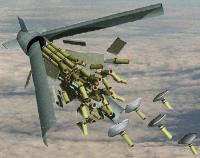Under normal circumstances, it's nearly impossible to get countries to restrict the use of widely available weapons that are seen as militarily advantageous. At the moment, however, two groups of countries are competing to sharply cut back on one type armament that humanitarian groups claim pose a particular danger to civilians in war zones: cluster munitions. Cluster munitions are bombs, rockets, and artillery shells that disperse smaller submunitions over broad areas. These grenades or bomblets, sometimes numbering as many as 600 submunitions from a single munition, can fail to detonate immediately yet maim or kill if disturbed later. Officials of the U.S., U.K. and other governments have argued in the past that some of these weapons need to be retained because they have a unique military utility in dealing with dispersed or moving targets. For example, they say the weapons allow one pilot to hit a column of tanks in the open, rather than requiring many planes to undergo dangerous flights. And they say that the dangers of the weapons can be reduced by not using them in civilian areas and by using better designs, so submunitions explode as intended, leaving fewer to affect civilians in a conflict's aftermath. U.S. officials recently announced that they were planning to create a "quick reaction force" to handle threats to civilians from unexploded cluster bombs and other "explosive remnants of war."
Two International Efforts Compete to Impose Cluster Bomb Restrictions

